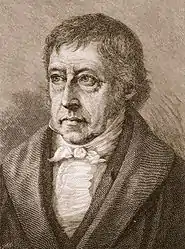Lectures on Aesthetics
Lectures on Aesthetics (LA; German: Vorlesungen über die Ästhetik, VÄ) is a compilation of notes from university lectures on aesthetics given by Georg Wilhelm Friedrich Hegel in Heidelberg in 1818 and in Berlin in 1820/21, 1823, 1826 and 1828/29. It was compiled in 1835 by his student Heinrich Gustav Hotho, using Hegel's own hand-written notes and notes his students took during the lectures, but Hotho's work may render some of Hegel's thought more systematic than Hegel's initial presentation.[1]

 |
| Hegelianism |
|---|
| Forerunners |
| Successors |
| Principal works |
| Schools |
| Related topics |
| Related categories |
|
► Georg Wilhelm Friedrich Hegel |
Hegel's Aesthetics is regarded by many as one of the greatest aesthetic theories to have been produced since Aristotle.[2] Hegel's thesis about the historical dissolution of art has been the subject of much scholarly debate and influenced such thinkers like Theodor W. Adorno, Martin Heidegger, György Lukács, Jacques Derrida and Arthur Danto. Hegel was himself influenced by Johann Joachim Winckelmann, Immanuel Kant, Friedrich Schiller and Friedrich Wilhelm Joseph Schelling. Heidegger calls Hegel's Lectures on Aesthetics "the most comprehensive reflection on the essence of art that the West possesses".[3]
Content
Hegel develops his account of art as a mode of absolute spirit that he calls "the beautiful ideal," which he defines most generally as
Now when truth in this its external existence [Dasein] is present to consciousness immediately, and with the concept remains immediately in unity with its external appearance, the Idea is not only true but beautiful. Beauty is determined as the sensible shining of the Idea.[4]
This ideal is developed throughout the Lectures accordance Hegel's Logic:
- The first universal part is devoted to the concept of the artistic ideal.
- The second particular part examines this ideal as it actualizes itself in three stages:
- Symbolic art, understood to encompass everything before Classical Greek art
- Classical art
- Romantic art, understood to emerge with the advent of Christianity on the world stage
- The third singular part concerns itself with an examination of each of the five major arts in ascending order of "inwardness":
- architecture
- sculpture
- painting
- music
- poetry
In these second two parts of the Lectures, Hegel documents the development of art from the paradigmatically symbolic architecture to the paradigmatically classical sculpture to the romantic arts of painting, music, and poetry. At the time it was noted for the wealth of pictures included with it.
Contrary to once-common belief, Hegel nowhere declares art to be "dead." What he says, in a representative statement is, "For us art counts no longer as the highest mode in which truth procures existence for itself."[5] He speaks frequently of its "dissolution" [Auflösung], not its end [Ende], despite Hotho's use of the latter for the heading of the final moment of the Romantic art form.
Transcripts
- Vorlesung über Ästhetik. Berlin 1820/21. Eine Nachschrift, ed. H. Schneider. Frankfurt am Main: Peter Lang, 1995.
- Vorlesungen über die Philosophie der Kunst, ed. A. Gethmann-Siefert. Hamburg: Felix Meiner Verlag, 2003.
- Philosophie der Kunst oder Ästhetik. Nach Hegel. Im Sommer 1826. Mitschrift Friedrich Carl Hermann Victor von Kehler, eds. A. Gethmann-Siefert and B. Collenberg-Plotnikov. Munich: Wilhelm Fink Verlag, 2004.
- Philosophie der Kunst. Vorlesung von 1826, eds. A Gethmann-Siefert, J.-I. Kwon and K. Berr. Frankfurt am Main: Suhrkamp Verlag, 2004.
English translations
- Aesthetics. Lectures on Fine Art, trans. T.M. Knox, 2 vols. Oxford: Clarendon Press, 1975.
Notes
- G. W. F. Hegel, Aesthetics. Lectures on Fine Art, trans. T. M. Knox, 2 vols. Oxford: Clarendon Press, 1975.
- Houlgate, 2009
- Martin Heidegger, Gesamtausgabe, vol. 5, Frankfurt, 1977, p. 68.
- (LA 111/VÄ I.151)
- LA 103/VÄ I.141
References
- Houlgate, Stephen (ed.), 2007, Hegel and the Arts. Evanston, Ill.: Northwestern University Press.
Further reading
- Adorno, Theodor W., 2004, Aesthetic Theory, Continuum International Publishing Group.
- Bungay, Stephen, 1984, Beauty and Truth. A Study of Hegel's Aesthetics. Oxford: Oxford University Press.
- Danto, Arthur Coleman, 1986. The Philosophical Disenfranchisement of Art. Columbia University Press.
- Danto, Arthur C., 1998, After the End of Art, Princeton University Press.
- Derrida, Jacques, 1987, The Truth in Painting, trans. Geoffrey Bennington & Ian McLeod. Chicago & London: Chicago University Press.
- Desmond, William, 1986, Art and the Absolute. A Study of Hegel's Aesthetics. Albany: SUNY Press.
- Gethmann-Siefert, Annemarie, 1984, Die Funktion der Kunst in der Geschichte. Untersuchungen zu Hegels Ästhetik. Bonn: Bouvier (in German language).
- Gethmann-Siefert, Annemarie, Einführung in Hegel's Ästhetik, Wilhelm Fink (German).
- Geulen, Eva, 2006, The End of Art. Readings in a Rumor after Hegel, trans. J. McFarland. Stanford: Stanford University Press.
- Lukács, György, 2002, Hegel's Aesthetics, Graduate Faculty Philosophy Journal, vol. 23, Nr 2, 87-124.
- Maker, W. (ed.), 2000. Hegel and Aesthetics. New York.
- Olivier, Alain P., 2003. Hegel et la Musique. Paris (French).
- Pippin, Robert, 2009. "The Absence of Aesthetics in Hegel’s Aesthetics", The Cambridge Companion to Hegel and Nineteenth-Century Philosophy , New York .
- Roche, Mark-William, 1998. Tragedy and Comedy. A Systematic Study and a Critique of Hegel. Albany. New York.
- Rutter, Benjamin (2010), Hegel on the Modern Arts, Cambridge: Cambridge University Press
- Wyss, Beat, 1999, Hegel's Art History and the Critique of Modernity. Cambridge: Cambridge University Press.
- Winfield, Richard Dien, 1996. Stylistics. Rethinking the Artforms after Hegel. Albany, Suny Press.
External links
- Hegel’s Lectures on Aesthetics web version of Selections from Hegel's Lectures on Aesthetics, by Bernard Bosanquet & W.M. Bryant, "The Journal of Speculative Philosophy", 1886; published by Marxists Internet Archive
- Houlgate, Stephen. "Hegel's Aesthetics". In Zalta, Edward N. (ed.). Stanford Encyclopedia of Philosophy.
- German text in .pdf format.